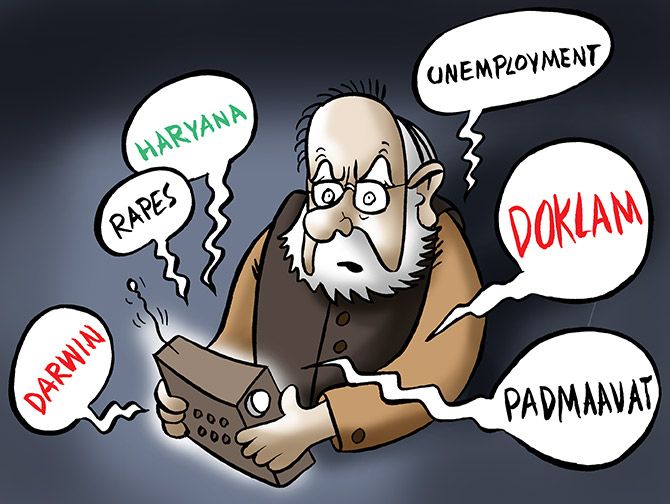'Modi maintains what has been called a 'strategic silence' on controversial topics,' points out Amulya Ganguli.
Illustration: Uttam Ghosh/Rediff.com

Narendra D Modi has asked those who listen to his weekly monologue on radio, Mann Ki Baat, to send him suggestions on the subjects on which, they think, he should dwell.
In response, Rahul Gandhi, in his freshly-minted naughty mood, mentioned unemployment, rapes in Haryana, Doklam, etc obviously to rile the prime minister.
It is unlikely that the latter will oblige if only because he is known to maintain what has been called a 'strategic silence' on controversial topics.
In keeping with this outlook, it is possible to list several issues which he is likely to avoid in the foreseeable future.
The film, Padmavat, is one of them.
Considering how the BJP-ruled states have been aflame with the violent antics of the Karni Sena, a militia claiming to represent the Rajputs, against the depiction of their historical/mythical 13th century heroine, Padmini or Padmavati, in the film, the prime minister might have been expected to refer to the matter.
But there are reasons why he hasn't.
One of them is the same which made the BJP-run state government in Rajasthan first ban the screening of the film, and, then, when the Supreme Court negated the ban, fail -- willingly or otherwise -- to ensure its peaceful screening.
Why has the Vasundhara Raje government acted so coy when a ban -- even a temporary one on the Karni Sena -- would have been more logical than a ban on the film ?
The explanation lies in the government's reluctance to antagonise the Rajput community when the assembly elections are due in a few months time.
The Rajputs are said to be the second most politically dominant community in the state (after the Jats) with 26 MLAs out of 200 in the state legislature.
In public perception in the rest of the country, Rajasthan is synonymous with Rajputs.
As it is, the state government is believed to be facing a strong anti-incumbency factor. So, understandably, it doesn't want to aggravate the situation any further in its disfavour by getting on the wrong side of the Karni Sena, which has other outfits like the usual suspects of the saffron brotherhood like the VHP and the Bajrang Dal on its side.
However, what the ruling BJP does not seem to realise is that one reason for the anti-incumbency factor in Rajasthan is its failure -- again willingly or otherwise -- to act against law-breakers like the gau rakshaks even when they kill.
One of their recent victims was Pehlu Khan whose murderers went scot-free for lack of evidence although the entire episode of their assault on the hapless cattle trader was caught on camera and shown multiple times on television.
Similarly, the Karni Sena's violence has also become a matter of public record in the age of ubiquitous television cameras to the detriment of the BJP’'s electoral prospects in Rajasthan and elsewhere.
It has to be noted that the prime minister has spoken out against the gau rakshaks once or twice, especially when they target the Dalits.
But that is probably in order to, first, assure the Dalits of his compassion so that they do not desert the BJP, and, secondly, because the cow vigilantes do not represent a community but are stray hoodlums.
But the Karni Sena is different although it is difficult to believe that large sections of the Rajputs endorse their lawlessness.
There can be another reason why Modi may not want to talk about Padmaavat. It is that any reference will raise the question of the worth of the established institution -- in this case, the central board of film certification.
Once a film has been cleared by the board, neither the state governments nor a group of thugs can stop its screening. This is the truism reiterated by the Supreme Court.
But if the censor board is disregarded, the judiciary can be the next in line since the saffron camp said in the 1990s that the courts cannot have any say in a matter of faith such as the putative birthplace of Lord Ram.
Like the film, Padmaavat, a Union minister's trashing of Darwin's thesis on evolution is another topic which Modi is likely to avoid.
This is a sensitive subject for various reasons.
One is the choice of a minister for the human resource department which deals with education.
Modi's selections for this ministry have tended to be quirky. His first nominee for the minister's post was Smriti Irani, who has studied only up to Class 12.
Now, the views of Minister of State Satyapal Singh, who says he is a 'man of science' with a degree from Delhi university, raises questions not only about his academic credentials but also about the university's teaching standards.
If a person can emerge from the institution who says that Darwin was wrong because no one has seen an ape turn into a man, it means that something is seriously wrong about the manner in which science is taught in one of the country's premier universities.
If Modi stays away from any reference to this matter, it will be not only because the minister's observation has once again drawn attention to the paucity of capable persons in the ruling party, but also because the subject of science will bring up the prime minister's own belief that Lord Ganesh's elephant head was the result of plastic surgery in ancient India.
No wonder that it is said that silence is golden.
Amulya Ganguli is a writer on current affairs.










